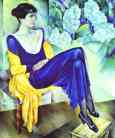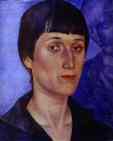Anna Akhmatova
 Akhmatova,
Anna, pseudonym of Anna Andreevna Gorenko (1889-1966) Russian poetess,
born in Odessa into the family of a naval officer. She started to write
very early to ultimate horror of her parents; her father told her not to
shame the family name by becoming a “decadent poetess”. She chose the name
of her great-grandmother as a literary pseudonym not to embarrass the family.
For some time she studied at law school in Kiev. In 1910, she married Nicolai
Gumilev (1886-1921), himself a poet and critic, who at first considerably
influenced her style. They spent the spring of 1910, their honeymoon, in
Paris, where Anna met the Italian artist Amedeo Modigliani (1884-1920)
and fell in love with him. Summer of 1911 she spent with Modigliani in
Paris. Under the influence of this love affair she wrote many lyrical poems,
many of which formed up her first book, Evening (1912).
Akhmatova,
Anna, pseudonym of Anna Andreevna Gorenko (1889-1966) Russian poetess,
born in Odessa into the family of a naval officer. She started to write
very early to ultimate horror of her parents; her father told her not to
shame the family name by becoming a “decadent poetess”. She chose the name
of her great-grandmother as a literary pseudonym not to embarrass the family.
For some time she studied at law school in Kiev. In 1910, she married Nicolai
Gumilev (1886-1921), himself a poet and critic, who at first considerably
influenced her style. They spent the spring of 1910, their honeymoon, in
Paris, where Anna met the Italian artist Amedeo Modigliani (1884-1920)
and fell in love with him. Summer of 1911 she spent with Modigliani in
Paris. Under the influence of this love affair she wrote many lyrical poems,
many of which formed up her first book, Evening (1912).
 The
same year that her first book was published, 1912, her son Lev Gumilev
(1912-92) was born. He would become an outstanding historian, geographer,
and philosopher. But meanwhile his father put the child under supervision
of his own mother, who disliked Anna. Akhmatova tried to protest the situation,
but Nicolai supported his family; Anna visited her son during holidays
and summer. She wrote that she ‘was a bad mother’, that “motherhood is
a bright torture. I was not worthy of it.”
The
same year that her first book was published, 1912, her son Lev Gumilev
(1912-92) was born. He would become an outstanding historian, geographer,
and philosopher. But meanwhile his father put the child under supervision
of his own mother, who disliked Anna. Akhmatova tried to protest the situation,
but Nicolai supported his family; Anna visited her son during holidays
and summer. She wrote that she ‘was a bad mother’, that “motherhood is
a bright torture. I was not worthy of it.”
The book Evening made Akhmatova a very popular poetess, and her second book Beads (also sometimes translated as Rosary), 1914, established her reputation. Together with Nikolai Gumilev she was looked at as a founder of the neo-classicist Acmeist movement, which preferred clear and precise verses opposite to the vague Symbolism.
 Akhmatova’s
third book The White Flock was published in 1917. She remained as
far as possible neutral to the Bolshevik Revolution (November 1917). But
her husband, from whom she had parted in 1918, was arrested and shot as
a counter-revolutionary in 1921, which influenced immensely both her and
her son’s life. After the publication of Anno Domini (1922),
she was officially silenced until 1940. During this period she wrote critical
essays and translations, worked on a long poem Requiem, devoted
to the victims of Stalin’s repressions. In 1940, she was allowed to publish
a collection of her previously published poems, but soon the book was withdrawn
as her verse was ‘too remote from socialist reconstruction’. Her son, Lev,
was arrested in 1949 and held in jail until 1956. To try to win his release,
Akhmatova wrote poems in praise of Stalin and the government, but it was
of no use. Later she requested that these poems not appear in her collected
works.
Akhmatova’s
third book The White Flock was published in 1917. She remained as
far as possible neutral to the Bolshevik Revolution (November 1917). But
her husband, from whom she had parted in 1918, was arrested and shot as
a counter-revolutionary in 1921, which influenced immensely both her and
her son’s life. After the publication of Anno Domini (1922),
she was officially silenced until 1940. During this period she wrote critical
essays and translations, worked on a long poem Requiem, devoted
to the victims of Stalin’s repressions. In 1940, she was allowed to publish
a collection of her previously published poems, but soon the book was withdrawn
as her verse was ‘too remote from socialist reconstruction’. Her son, Lev,
was arrested in 1949 and held in jail until 1956. To try to win his release,
Akhmatova wrote poems in praise of Stalin and the government, but it was
of no use. Later she requested that these poems not appear in her collected
works.
 She
was ‘rehabilitated’ in the late 1950s, but her works were heavily censored.
Akhmatova’s later works include Poem Without a Hero and the banned
Requiem (Munich, 1963), which was published in Russia in full only
in 1987, a moving cycle of poems on the Stalin purges; memoirs about the
artist Amedeo Modigliani,
poets Alexander Blok and Osip Mandelstam.
She
was ‘rehabilitated’ in the late 1950s, but her works were heavily censored.
Akhmatova’s later works include Poem Without a Hero and the banned
Requiem (Munich, 1963), which was published in Russia in full only
in 1987, a moving cycle of poems on the Stalin purges; memoirs about the
artist Amedeo Modigliani,
poets Alexander Blok and Osip Mandelstam.
In 1964, Akhmatova was awarded the Etna-Taormina prize (Italy) and an honorary doctorate from Oxford University (UK) in 1965. Her journeys to Sicily, England and Paris were her first travels outside Russia since 1912.
Two years before her death at the age of 76, Akhmatova was chosen the president of the Writers' Union of the USSR. Anna Akhmatova died in Leningrad (St. Petersburg) in 1966.
Nathan Altman. Portrait of
Anna Akhmatova.
Amedeo Modigliani. Nude.
(Anna Akhmatova). Nude.
(Anna Akhmatova). Anna
Akhmatova.
Kuzma Petrov-Vodkin. Portrait
of Anna Akhmatova.
Nikolai Tyrsa. Portrait of Anna Akhmatova.
Related article:
Anna and Amedeo.
Bibliography:
Chambers Biographical Dictionary. Chambers Harrap Publishers
Ltd. 1996.
Poems. By Anna Akhmatova. Introductory article by A. Pavlovsky.
Leningrad. 1989.
Prose of the Poet. By Anna Akhmatova. Introductory article by
A. Neiman. Moscow. 2000.
Memoirs about Anna Akhmatova by Her Contemporaries. Moscow &
Leningrad.
The
Complete Poems of Anna Akhmatova by Roberta Reeder (Editor),
Judith Hemschemeyer (Translator), Anna Andreevna Akhmatova. Zephyr Pr,
1998.
My
Half-Century: Selected Prose by Ronald Meyer (Editor), Anna
Andreevna Akhmatova. Northwestern University Press, 1997.
The
Guest from the Future: Anna Akhmatova and Isaiah Berlin by
Gyorgy Dalos, Antony Wood (Translator), Andrea Dunai. Farrar Straus &
Giroux, 1999.